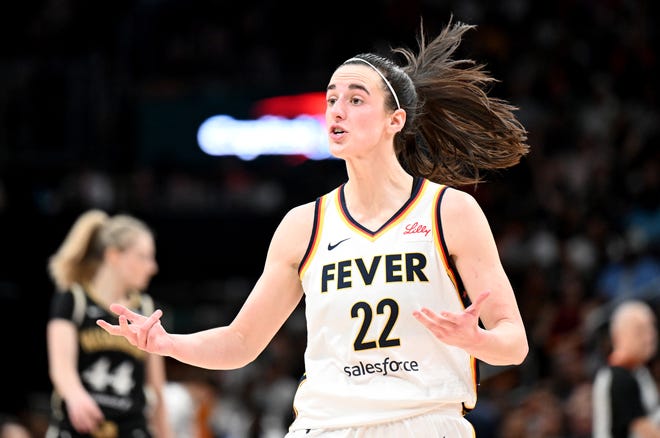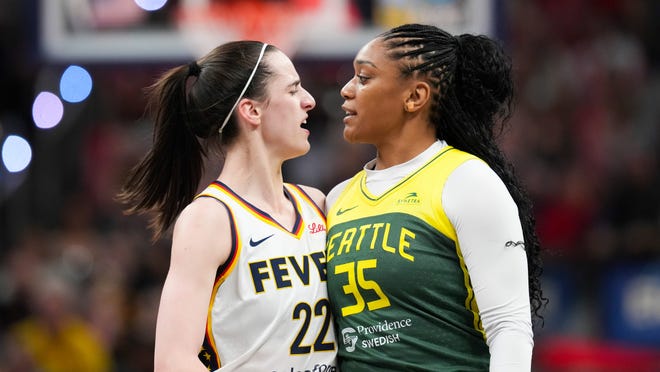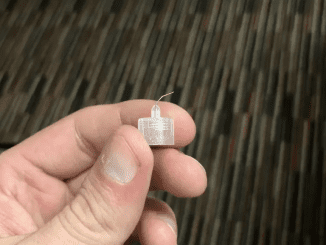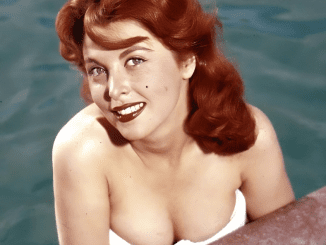You can love Caitlin Clark. You can hate Caitlin Clark. You can love her Iowa roots. You can hate her Iowa roots. You can like her because she’s white, or dislike her because she’s white. Same goes for being straight. You can love the media’s fascination with her, or hate it. You can love the historic TV ratings and sell-out crowds, or hate them. You can love her interviews, or hate them.
But there’s one thing that we all know to be true:
With Caitlin Clark on the 2024 U.S. Olympic women’s basketball team, players who have been largely ignored by the sports media at every Summer Olympic Games that I’ve covered, which is every one since 1984, would have finally received the spotlight they deserve from a national and global audience.
Going into the Games, with national sensation Clark on the roster, I think the top storylines for the Americans in Paris (and quite a few international reporters) would have been these: 1. Simone Biles, 2. Katie Ledecky 3. Caitlin Clark.
Maybe you add an athlete or team or two here or there, U.S. women’s soccer, U.S. men’s basketball, take your pick, but that’s the general idea. With Clark continuing to set records for TV ratings and attendance in her first eye-popping month in the WNBA as she did in NCAA basketball, it would have been inevitable: she would catapult U.S. women’s basketball to a place it so richly has deserved but has never attained — coverage from broadcasters and news organizations not just in the U.S. but around the world, headlines every day, and most important, vastly increased respect from a still male-dominated international sports media that has for decades focused almost exclusively on the U.S. men’s basketball team rather than the women, who are so good they haven’t lost since 1992.

But following Clark would have meant following much more than Clark. She would have introduced all those Olympic viewers and readers — many of whom are not big sports fans and have never watched a women’s Olympic basketball game — to the entire U.S. team.
You’ve never watched Breanna Stewart on one of her two previous Olympic teams? You would have been watching her this summer because America’s interest and even obsession with Clark would have brought you there. Same goes for Brittney Griner, assuming she’s healthy.
But Clark isn’t coming to Paris, unless someone withdraws or is injured. Clark won’t be there to bring the casual sports fan who fell in love with her at Iowa and now knows the difference between ION and Prime to finally and rightfully watch Diana Taurasi and Jackie Young at the Olympics.
She won’t be there, so all those fans won’t be there, because they’re never there. And one could only have imagined the global appeal of Clark once writers and reporters from around the world dropped in and watched a few logo 3s fall from the sky and a few hundred more autographs be recorded for posterity. Perhaps little girls in Europe and Africa would have been just as entranced as girls in America are. That’s not happening anymore, and it’s all on USA Basketball, whose mission statement fascinatingly includes “promoting, growing and elevating the game at all levels.” (Seems to be Caitlin Clark’s job description these days.)
Because this great opportunity to publicize international women’s basketball has been eliminated, the vast majority of broadcasters and reporters will be able to focus as they always have on the swimmers and gymnasts and runners, and leave the U.S. women’s basketball team alone.
I’ve watched all this happen in real time. I’ve covered at least five of the U.S. women’s gold-medal basketball games at the Olympics, plus countless other women’s basketball stories at the five other Summer Games I’ve attended. When I’ve looked around and seen a half-empty press tribune and wondered why, the answer I received from my peers always was that the Americans are just too good for their own good. People already know they’re going to win. And they’re right.
But something strange and potentially much most impactful is percolating around the snub of Clark. Two sources, both long-time U.S. basketball veterans with decades of experience in the women’s game, told me Friday that concern about how Clark’s millions of fans would react to what would likely be limited playing time on a stacked roster was a factor in the decision making.
If true, that would be an extraordinary admission of the existence of real tension that the old guard of women’s basketball harbors for this multi-million-dollar sensation. The two people spoke on the condition of anonymity because of the sensitivity of the matter.
But if the players and USA Basketball officials think not having Clark in Paris means people won’t be talking about Clark around them, well, that’s just not going to happen. It’s a sure thing that one of the first questions they will receive at their opening press conference at the Games will be: “Why isn’t Caitlin Clark here?”
And if the team is missing 3’s, or has a scare, or doesn’t play well, or, horrors, loses, Clark’s name won’t be far behind and likely will become omnipresent back on the home front.
Speaking of 3’s, there seems to be a notion out there that Clark didn’t deserve to be put on the team on merit. That’s ridiculous. First of all, the decision is subjective, so you can make a case for just about anyone and everyone.
But how about some statistics? Clark is 13th in the WNBA in points per game. (Taurasi is 15th.) Clark is fourth in assists per game. (Sabrina Ionescu, 8th; Kelsey Plum, 11th; and Jewell Loyd, 14th, all are on the list for the Olympic team). Clark is second in 3-pointers made, two ahead of Taurasi.
In her first 10 games, Clark scored more than 150 points and had more than 50 rebounds and 50 assists, a feat previously accomplished only by Ionescu in WNBA history. She also became the first rookie and only the fourth player ever in the league to record 30 points, five rebounds, five assists, three steals and three blocks in a game, joining Taurasi, Stewart and Angel McCoughtry.
Just hours before she found out she wasn’t going to be on the Olympic team, Clark made a WNBA rookie record-tying seven 3’s and scored 30 points in front of the largest WNBA crowd in 17 years: 20,333 in D.C., more than double the crowd Chicago drew the night before in the same arena. She became the first player in WNBA history with 200 points and 75 assists in her first 12 career games.
And then USA Basketball dumped her.

Clark has done all of this while facing the fiercest defensive pressure statistically in the league. No one has received the kind of attention she has as a rookie. She is not the best player in the league, but she’s clearly the most important.
Never given a real chance to try out — USA Basketball preposterously scheduled her tryout during the Women’s Final Four, when she was leading Iowa to the national title game for a second consecutive season — Clark now has been told by the U.S. national governing body of basketball one simple word: No.
No, Caitlin Clark, we don’t want you on our Olympic team.
I’ve seen some bad team and athlete selection decisions in the 40 years I’ve covered the Olympics, but this is the worst by far. Then again, we probably shouldn’t be surprised. As we’ve known for years, the last amateurs left in the Olympic Games are the people running them.


